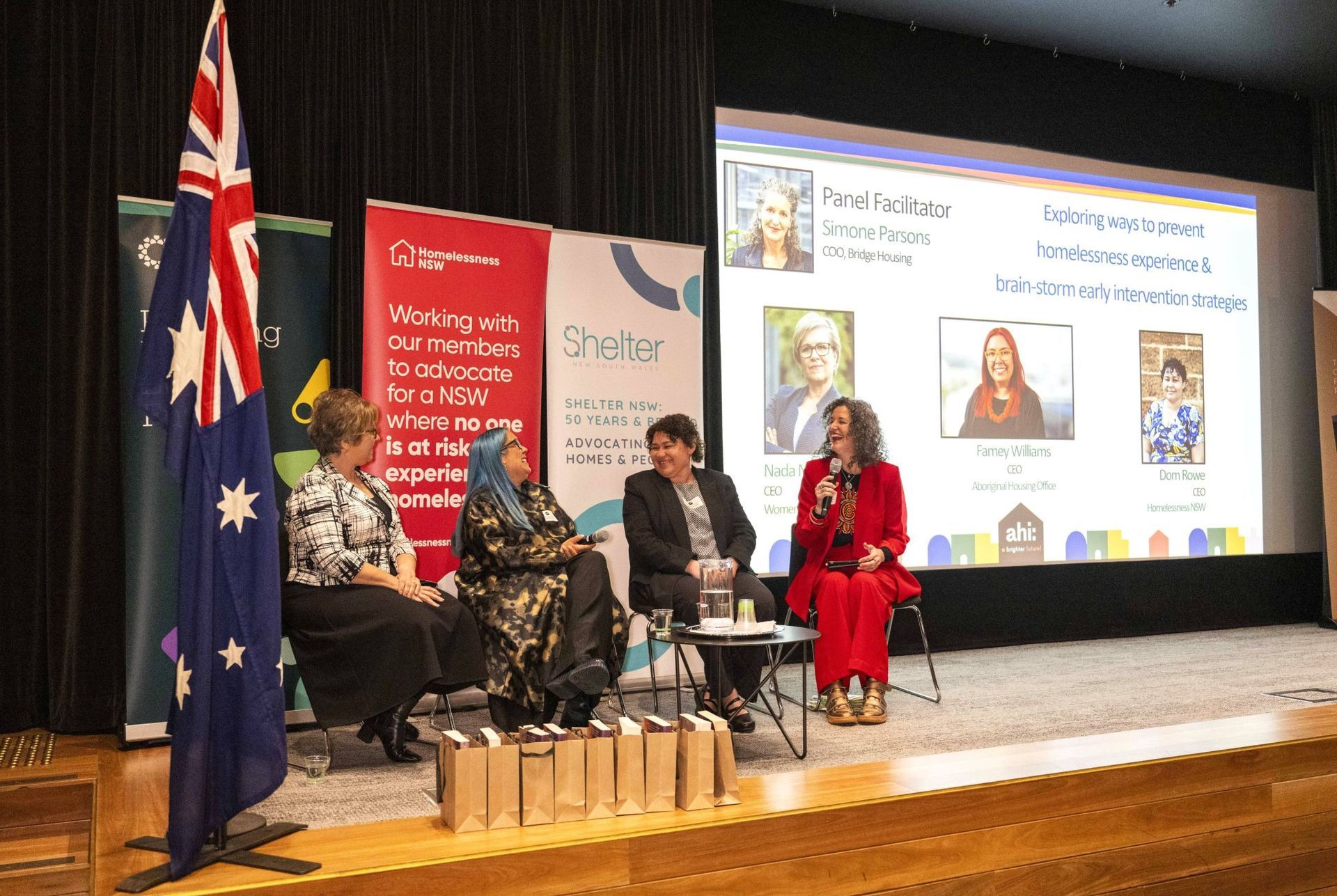Nicole Harvey
Pacific Link Housing
The impacts of homelessness, particularly for those sleeping rough, have often gone unrecognised. When the COVID-19 pandemic emerged, those sleeping in our streets, parks and cars were suddenly in the spotlight, with many asking a key question:
How can you isolate at home, when you don’t have a home to isolate in?
The escalating health emergency combined with the NSW Government’s commitment to halve street sleeping by 2025 was the catalyst for the launch of the Together Home Program across NSW in 2020. During the pandemic, the Department of Communities and Justice tasked community housing providers with securing properties for those accessing temporary accommodation due to homelessness.
Pacific Link Housing – a Tier 1 housing provider with a strong reputation for delivering safe, secure and affordable housing – successfully implemented and continues to provide this vital program for 46 participants across the Central Coast.
The Together Home Program has facilitated vital health and therapeutic interventions for those who are now housed, with some of these complexities having never been addressed previously. The program goes beyond mere housing; it aims to restore personal health and wellbeing, while providing opportunities to reconnect with family, community and culture, restoring hope for many.
Prior to the pandemic, homelessness had been a largely invisible and growing crisis in communities. With COVID-19 and the ensuing housing crisis, the Together Home Program not only afforded homes for many in NSW but produced valuable implementation and practice learnings for both practitioners and housing providers.
As the Program developed, it became apparent that these impacts, benefits and learnings needed analysing and evaluating by accredited researchers. Drawing on an existing, strong relationship with the University of Newcastle, the collaborative research efforts commenced and resulted in the co-funded research project: Together Home Practitioners' Perspectives on Building Resilience and Relationships.
The research project used a range of methodologies and qualitative data, tracking the Program’s progress and success over the first tranche’s funding. Pacific Link Housing had developed a broad sector network of support agencies and specialist services who contributed to, and participated in, the data collection through group and individual interviews and workshops. The research project was officially published in August 2023.
This evidence-based academic research highlights the profound impact of the Together Home Program. Through Housing First principles – including intensive, long-term support for participants – practitioners developed crucial insights that could reshape our approach to homelessness. The long-lasting effects of systemic failures and a fractured housing and service system emerged as a critical issue, resulting in advocacy opportunities.
One of the most inspiring stories from the program features Kevin, who had endured over five years of homelessness and the painful estrangement from family and friends. His journey took a pivotal turn when he entered the Together Home Program.
"Together Home came into my life at one of the biggest forks in the road I've ever faced. I was at the lowest point, worn down economically and emotionally."
"Together Home came into my life at one of the biggest forks in the road I've ever faced. I was at the lowest point, worn down economically and emotionally," says Kevin.
The Program became a lifeline for Kevin, providing him with a secure home on the Central Coast and, most remarkably, helping him reconnect with his loved ones. His transformation underscores the Program's immense impact on individuals and families in dire need of stable and secure housing.
The importance of a comprehensive support system in empowering individuals to rebuild their lives and establish meaningful connections cannot be underestimated.
The report showcases the success of the Together Home Program through several case studies and participant narratives, with the success attributed to a collective understanding that stable and secure housing is just the beginning. The program practitioners provided the necessary resources, connections and support for individuals to regain their dignity and create lasting change.
The Together Home Program allowed for immense flexibility in service delivery, early intervention strategies for tenancies with risk indicators, and a tailored and individualised approach for each participant. The report has demonstrated the criticality of long-term, specialist support provision – which is client-centred and directed – working with participants in addressing unresolved and complex issues, and the drivers of long-term homelessness.
"Research has provided evidence that fragmented, fractured and disconnected service systems and rigid eligibility and criteria are detrimental and ineffective."
The research also showed the importance of a respectful, open and collaborative framework of support services alongside the housing provider, working together and towards best practice in sustaining tenancies and achieving participant outcomes. The research has provided evidence that fragmented, fractured and disconnected service systems and rigid eligibility and criteria are detrimental and ineffective.
Service providers could offer specialised support in areas such as mental health, health, disability, drug and alcohol assistance, culturally sensitive support, and housing in a coordinated manner, forming part of a consortium. This approach has had far-reaching impacts on networking and information-sharing in the region and has led to the development of another pilot project, underpinned by the same principles, achieving outstanding outcomes.
Together Home sets an example of Housing First and wraparound support, offering not only secure housing but also access to health services, reestablishment of family relationships, connections to community and culture, employment opportunities, reductions in drug use and, as powerfully illustrated, dignity in death.
The compassion and dedication required in Together Home was clear when both supports and Pacific Link Housing extended kindness and companionship to six individuals who, sadly, passed away. Pacific Link Housing ensured respect, care and compassion in their final moments; a stark contrast to the harsh streets they once called home. This highlights the sobering impact of chronic homelessness on people's health, often exacerbated by disengagement from, or lack of access to, essential health services.
"The human side of this essential Program became apparent throughout the research, reminding us that we must never lose sight of the fundamental right to safe and secure housing."
The human side of this essential Program became apparent throughout the research, reminding us that we must never lose sight of the fundamental right to safe and secure housing. The success stories from the Together Home Program are a testament to our team and partners' dedication and hard work. This research reinforces the need for comprehensive funding for support and underscores the importance of building thriving, inclusive communities that empower individuals in need.
The publication of the research report is also timely, coinciding with the Minns’ Government Budget. [EW1] We are hopeful the impacts and benefits outlined in the report will serve as powerful advocacy for continued investment in a worthwhile, evidence-based program that addresses a key priority for the NSW Government.
The report offers several recommendations for the way forward:
The research report is a testament to the transformative impact of Pacific Link Housing's delivery of the Together Home Program and the capacity to create lasting change.
It's a reminder that homelessness is not an insurmountable problem but a challenge that can be overcome through unified efforts, comprehensive funding, innovative models of support and unwavering commitment.
The report offers a blueprint for action, and it's our collective responsibility to acknowledge its lessons and work towards a society where homelessness is rare, brief and non-recurring.
For access to the full report, visit the download link on Pacific Link Housing’s website.


We acknowledge the Wathaurong, Yuin, Gulidjan, and Whadjuk people as the traditional owners of the land where our team work flexibly from their homes and office spaces. The AHI recognises Aboriginal and Torres Strait Islander peoples as the first inhabitants of Australia and the traditional custodians of the lands where we live, learn and work. We acknowledge Māori as tangata whenua and Treaty of Waitangi partners in Aotearoa New Zealand.
Copyright © 2026 Australasian Housing Institute
site by mulcahymarketing.com.au